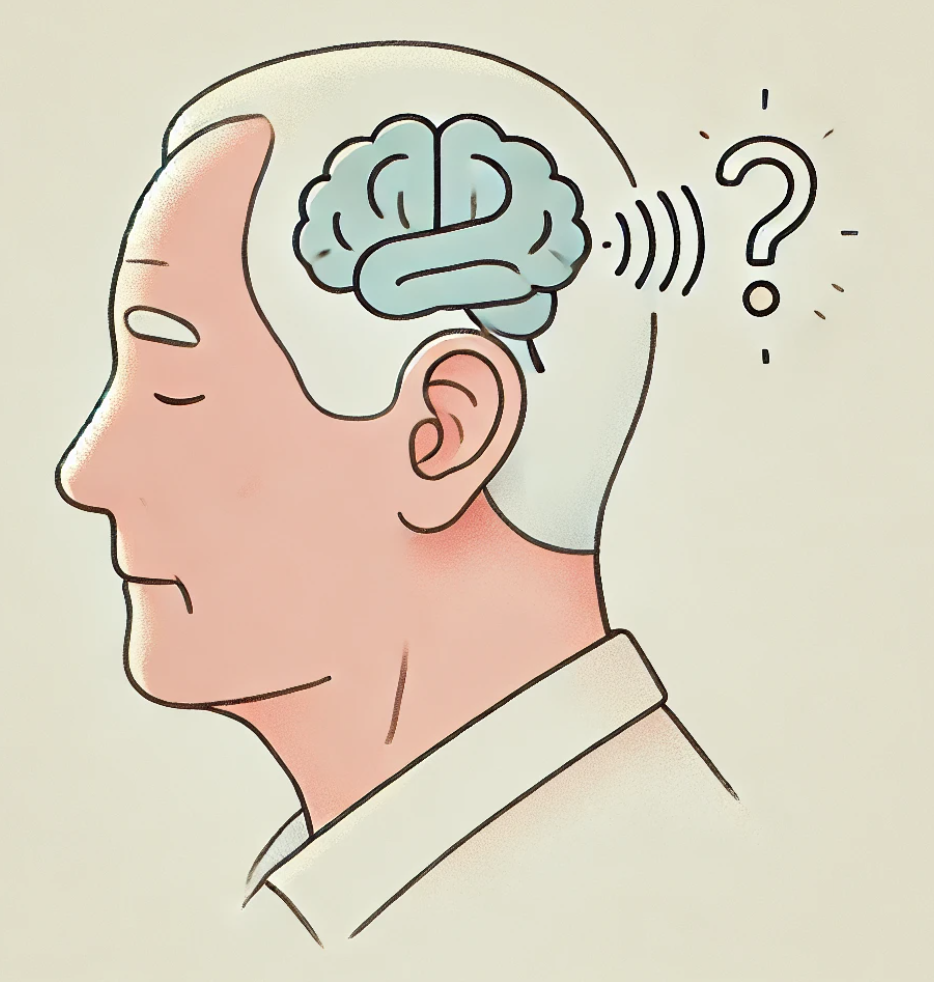Everyone knows hearing loss accompanies aging. What most don’t know is that it’s not just about the ears. As we get older, a lot of us still hear sounds just fine, but we find we can’t make out conversations in a noisy room, such as at a family gathering or in a busy café. What’s going on? The cause might actually be your brain, not just your ears. Here’s why, and (maybe) what you can do about it.

It’s the brain, not just the ears
For years, scientists focused on the ear when trying to understand age-related hearing loss. This makes complete sense; after all, the ear (specifically the cochlea) is where sound gets converted into signals that the brain can process. But in the last decades of research, scientists found that even when the ear is working fine, many older adults still struggle to understand speech (1,2). For example, adults aged 61-73 with normal hearing scored significantly worse on speech understanding in noisy environments than adults aged 18-30 with normal hearing (2). That’s because the brain, not the ear, is what processes the sounds into voices. The brain, especially the auditory cortex, plays a large role in helping us filter out background noise to let us focus on the sounds we want to hear. As we age, our brains tend to lose some of their fine-tuned ability to do this.
Studies in animals, specifically macaques, have shown that with aging, the brain’s auditory processing centers—like the primary auditory cortex and caudolateral field—start to function differently. The brain’s neurons start firing more often, even when they shouldn’t. This extra “noise” makes it harder for the brain to focus on important sounds like speech and filter out background sounds (3). So, when you’re having difficulty to follow a conversation in a noisy restaurant, the issue may not be with your ears, but with how your brain is processing all that noise.
What can you do about it?
Physical exercise might be the best approach to slow down cognitive aging. A meta analysis looking at many different studies ranging in exercise protocols and durations found that exercising for at least 52 hours (from an average of 25 weeks of intervention time in the studies; so that’s ~2 hours a week in practical terms) is associated with improved cognitive performance in older adults with and without cognitive impairment. Exercise modes included aerobic, resistance (strength) training, mind-body exercises, or combinations of these interventions (4). While it’s not yet clear if these can play a role in preserving your brain’s abilities to process sound too, it probably won’t hurt.
There may be other approaches as well. One recent study looked to preserve aging brain function with the low cost anti diabetes drug metformin. The researchers treated 12 elderly male macaques with metformin for a bit over 3 years (the rough equivalent of 13 years of treatment if it would have been humans) while 16 untreated elderly and 18 untreated younger macaques were used as controls. Using various molecular measures, they could assess the rate of aging of the macaques and found that metformin produced a 6-year regression in brain aging (5,6). More research is needed to see if similar metformin benefits can translate to humans (e.g. see my previous blog on metformin). Nonetheless, the recent findings in macaques add to the preliminary data that simple interventions may benefit brain aging (5,6). It remains to be seen how this can benefit hearing loss and the interface of brain voice/noise processing in humans, and as usual, more research is needed.
For what we know for now, probably your best bet is to just get out and move more. What is for sure though is if a hearing problem does develop, it is important to seek help. Untreated hearing loss was listed as one of the major potentially modifiable risk factor for dementia, alongside high LDL .
Going deeper:
1. Roque L, Karawani H, Gordon-Salant S, Anderson S. Effects of Age, Cognition, and Neural Encoding on the Perception of Temporal Speech Cues. Front Neurosci. 2019 Jul 19;13:749. doi: 10.3389/fnins.2019.00749. PMID: 31379494; PMCID: PMC6659127.
2. Alessandro Presacco, Jonathan Z Simon, Samira Anderson. Effect of informational content of noise on speech representation in the aging midbrain and cortex. Journal of Neurophysiology, 2016; jn.00373.2016 DOI: 10.1152/jn.00373.2016
3. Recanzone G. The effects of aging on auditory cortical function. Hear Res. 2018 Sep;366:99-105. doi: 10.1016/j.heares.2018.05.013. Epub 2018 May 23. PMID: 29853323; PMCID: PMC6103827.
4. Gomes-Osman J, Cabral DF, Morris TP, McInerney K, Cahalin LP, Rundek T, Oliveira A, Pascual-Leone A. Exercise for cognitive brain health in aging: A systematic review for an evaluation of dose. Neurol Clin Pract. 2018 Jun;8(3):257-265. doi: 10.1212/CPJ.0000000000000460. PMID: 30105166; PMCID: PMC6075983.
5. Yang Y, Lu X, Liu N, Ma S, Zhang H, Zhang Z, Yang K, Jiang M, Zheng Z, Qiao Y, Hu Q, Huang Y, Zhang Y, Xiong M, Liu L, Jiang X, Reddy P, Dong X, Xu F, Wang Q, Zhao Q, Lei J, Sun S, Jing Y, Li J, Cai Y, Fan Y, Yan K, Jing Y, Haghani A, Xing M, Zhang X, Zhu G, Song W, Horvath S, Rodriguez Esteban C, Song M, Wang S, Zhao G, Li W, Izpisua Belmonte JC, Qu J, Zhang W, Liu GH. Metformin decelerates aging clock in male monkeys. Cell. 2024 Sep 12:S0092-8674(24)00914-0. doi: 10.1016/j.cell.2024.08.021. Epub ahead of print. PMID: 39270656.
6. Kozlov M. The brain aged more slowly in monkeys given a cheap diabetes drug. Nature. 2024 Sep 12. doi: 10.1038/d41586-024-02938-w. Epub ahead of print. PMID: 39266738.
7. The Lancet, Risk Factors for Dementia. https://www.thelancet.com/infographics-do/dementia-risk
